All images by Stephanie Lee for RICE Media.
I think it’s fair to say that being a bus captain isn’t exactly what one would call a dream job—at least not in fair Singapore where tech, AI, and Web3 are all the rage. Yet here I am in the middle of Marsiling speaking to a group of 20-somethings who can’t wait to get back behind the wheels of their buses as soon as they’re done with this interview.
“Hearing stories from my bus captain friends back when I was 13 and seeing how they worked gave me a little bit of that push. That was when I knew I would get my bus driver’s licence in the future,” Muhd Naz Farihin explains.
Now 25, his eyes gleam as he tells me how he decided to be a full-time bus driver.
“Now, instead of having the chance to just joyride their buses, I am a full-fledged bus captain who commandeers my own vehicle.”
I’m sitting with Naz in the passenger area of a double-decker bus he operates as a bus captain at A&S Transit. The private bus enterprise offers bus charter services to companies, schools and travel agencies.
A&S Transit is currently home to 90 employees—82 of whom are bus captains. Others in the company take on operations, Human Resources, Business Development, and finance roles. They also own 120 buses stationed across the island, parked at heavy vehicle carparks.

Naz’s double-decker bus is parked at Marsiling Heavy Vehicle Parking. Located close to A&S Transit’s main office in Woodlands, it only takes Naz 15 minutes to get to work since he lives nearby.
It’s also freezing cold on the bus, thanks to the relentless rain. But Naz remains comfortable in his jacket, smiling as he reveals that he’s not just a bus captain. He’s also the Operational Support Officer at A&S Transit, a role that includes managing the company’s fleet of city buses and conducting training sessions for new drivers.
He can take on this additional portfolio because A&S Transit, now owned and managed by Marketing Manager Dexter Ang, gives opportunities to young bus enthusiasts and budding bus drivers such as Naz.
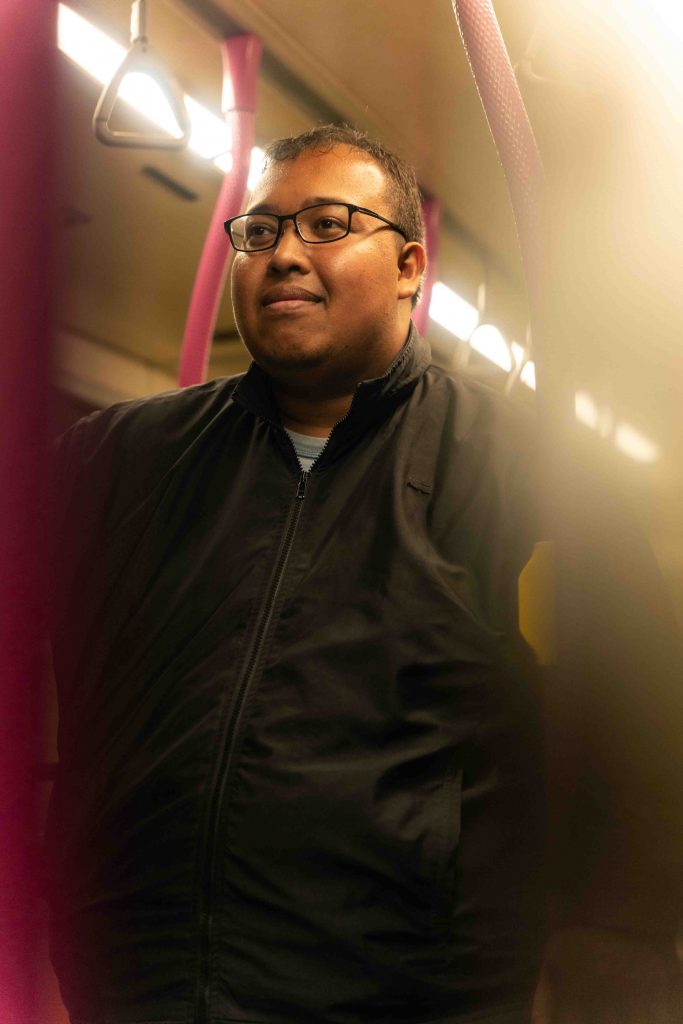
Supporting A Misunderstood Community
36-year-old Dexter inherited A&S Transit from his father, who established it in 1980.
In 2021, A&S Transit acquired a fleet of buses previously owned by SMRT, which were specially modified for the government to transport COVID-19 patients during the initial outbreak in 2020. Now that the pandemic is (more or less) handled, the buses were sold. Dexter tells me it’s rare for public bus models to be acquired by a private bus company.
Soon after the acquisition, Dexter began noticing a surge in bus enthusiasts approaching the company to check out these unique buses. It was unlike anything he’d seen before, despite his 10 years of tenure in the company. He welcomed these young bus fans with open arms.

These bus enthusiasts would often tell Dexter stories about how the public doesn’t seem to understand their hobby.
“One bus fan told me that his friend had been reported to the police because a member of the public thought that the bus fan was a terrorist who was taking photos of buses at the bus interchange.”
“There’s this burgeoning community out there, and no one is supporting them,” Dexter continues. “It’s high time an organisation actually went to support them.”
That’s how the FAST community (Friends of A&S Transit) was born. The group gave bus enthusiasts an official platform to submit photos and even participate in bus tours.
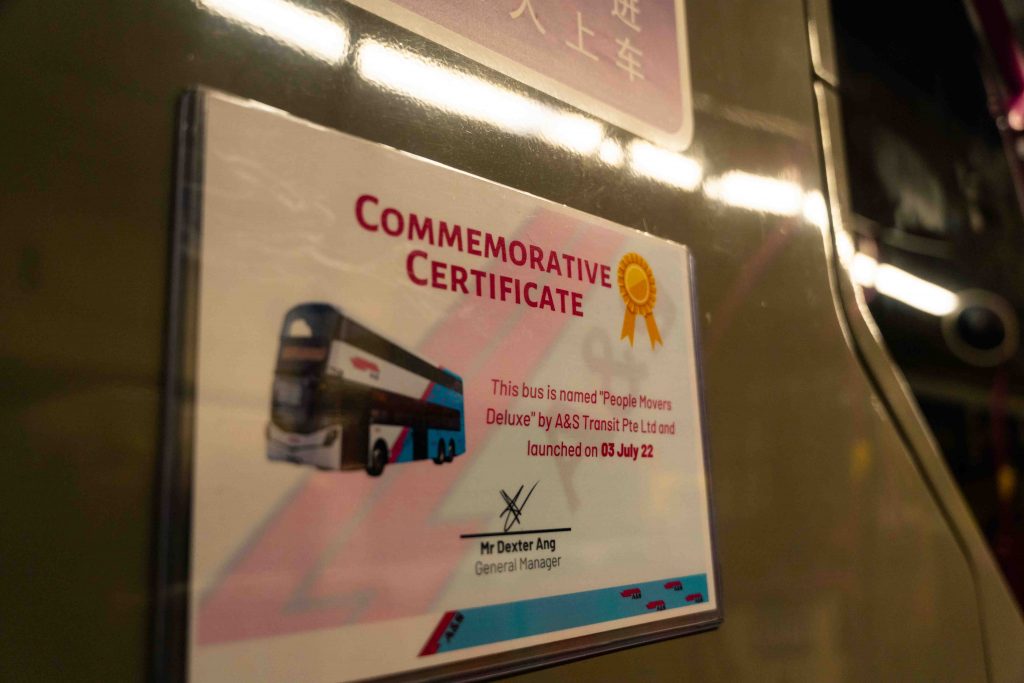
When some of them expressed an interest in driving buses, Dexter was more than happy to bring them on board.
“There’s a severe shortage of bus drivers in our industry. In older industries like these in Singapore, there’s always a very negative perception of the career,” Dexter explains.
He is, of course, referring to the typical notion that becoming a bus driver is an option for the uneducated. It’s common for Singaporean parents to warn their children that they’ll end up as bus drivers if they don’t do well in school.
Perhaps that’s why Dexter feels excited to see the younger generation bucking such stereotypes and choosing to pursue their passion. “I see this as a way the industry is starting to change.”
‘Music to my ears‘
Evidently, buses enthral and fascinate the bus captains of A&S Transit more than they did me.
I ask Naz what he loves most about buses. In response, he invites his fellow bus captains aboard the bus to share their thoughts.
For Dionte Lee, 21, the youngest bus captain at A&S Transit, “it all started from trains.”

When Dionte was 5 years old, his grandfather worked at Changi Airport, and the man would bring the boy out for train joyrides.
The first thing that caught Dionte’s attention was the sound of the trains that brought them to Changi Airport. “That was what got me involved with the trainspotting community in Singapore.”
Later, when Dionte was 12, he met like-minded enthusiasts at the Downtown Line Stage 1 Open House in 2013. They suggested that he check out buses as well. From there, he was hooked. Between gearboxes and various types of engines, the technical and engineering aspects of buses captivated Dionte.
Buses also create their own peculiar sound, which further sparked the young man’s curiosity about how different parts of a bus work together.
“It’s just the very interesting, melodic sound they make—it’s like music to my ears.”
A Yearning Borne out of Childhood
Part-time bus captain Ryan Quek, 22, echoes this sentiment. “The bendy buses also have unique sounds.”
Since he was 10, Ryan has been mesmerised by articulated buses (or ‘bendy buses’ for us normies).
These buses have a pivoting joint in the middle like an accordion, which produces a hypnotic undulation that Ryan enjoys looking out for.
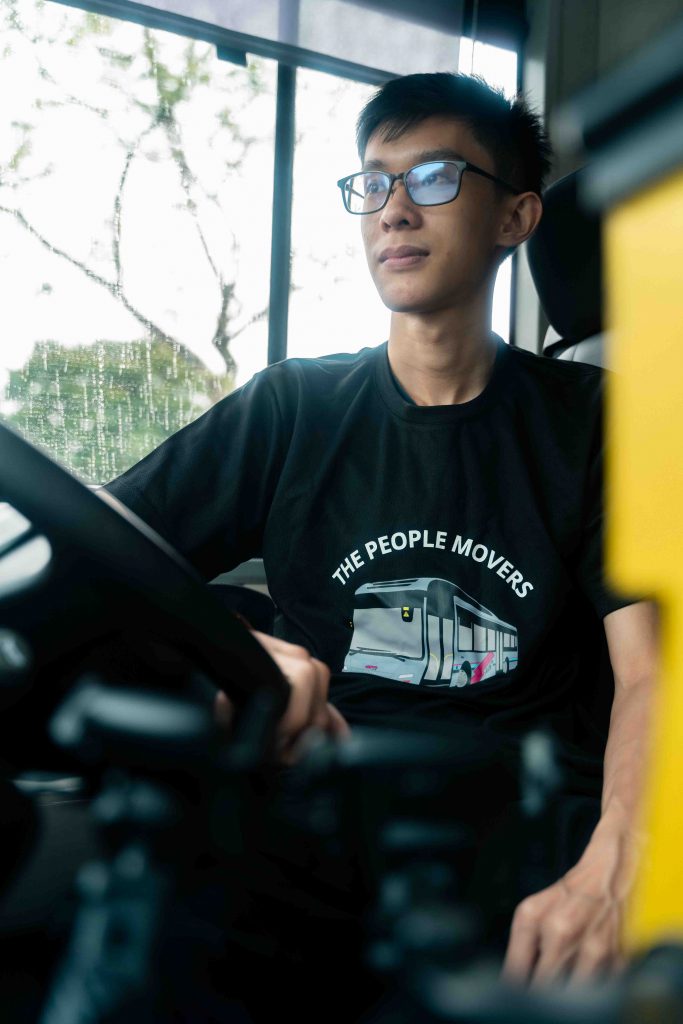
For many of the bus captains at A&S Transit, the simple act of commuting by bus at a young age was enough to kickstart their interest.
Naz’s first memories of buses are closely linked to the time spent with his father. As a preschooler, Naz often pestered his father to go on bus joyrides to discover different bus models.
For example, an old bus model that intrigued Naz operated a service along route 178, which went to Boon Lay. “So, I would bring my dad to Boon Lay to find this particular old bus model,” he recalls fondly.
Still, his dad wasn’t expecting him to be that serious about joining the public transport industry. “He was shocked when I finally made my dream happen in 2020. But he was happy to see I was doing something I loved.”
All that’s left, Naz tells me, is to take his family on a proper bus joyride.
Not All Passions Are Created Equal
Not all families are as encouraging and receptive as Naz’s.
Dionte’s family, for instance, did not take too kindly to the news that Dionte landed a part-time job as a bus captain.

Not only were they worried about his safety, but they also wondered why he’d want to work in a job typically reserved for middle-aged uncles. But as Dionte explained his decision and his passion, his family became more accepting of his chosen profession.
Even so, it’s a different story when he’s on the road. Dionte recalls being at the receiving end of judgement by the public, who doubt his ability due to his youth.
“Almost everywhere I go, there’s always a very questionable face when I tell people I’m a bus captain. They’re like, ‘oh really?'”
To be fair, it’s tough to find bus captains this young. I would more likely find a 21-year-old in the creative industry or building a career in Singapore’s burgeoning tech scene. Aloysius Liow, a fellow peer of the same age as Dionte, believes that it’s this reason why they struggle to gain the public’s trust.
In fact, it’s not out of the ordinary to see disparaging comments on TikTok videos featuring young bus captains. Some of the disheartening commenters accuse the drivers of being “young and reckless”—or that they probably did not do well in school.
Both couldn’t be further from the truth.
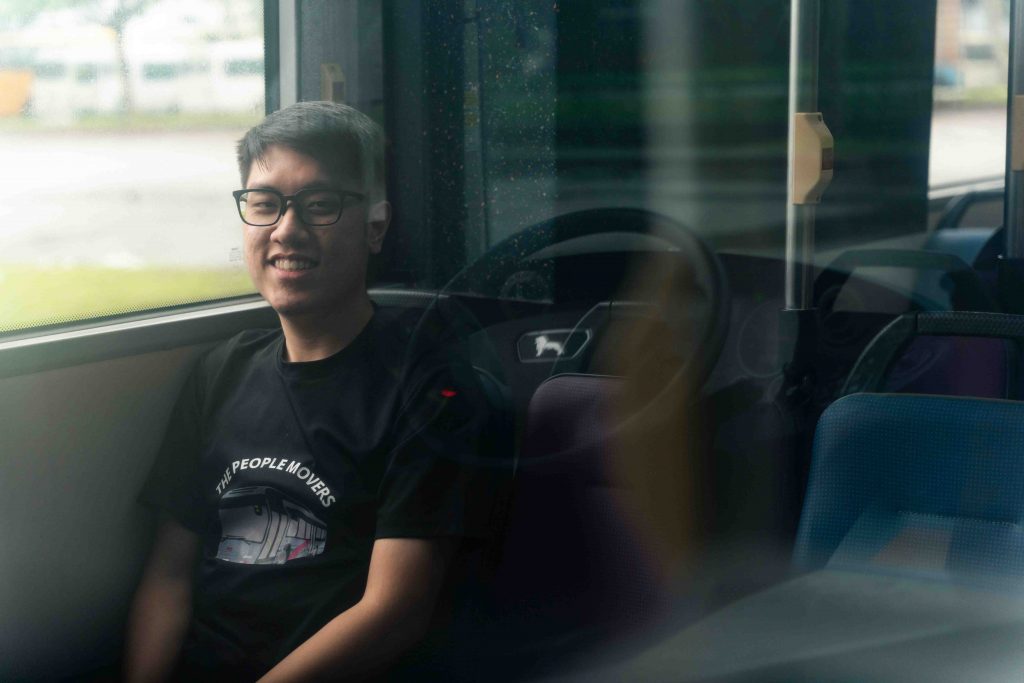
Of Stereotypes and Discrimination
Addressing the former, Dexter points out that “the way they drive is more careful than a lot of the older drivers because they know the buses very well.”
On the allegations that young bus captains did poorly in school, Dexter tells me otherwise. The younger drivers come from different and up-to-date educational backgrounds.
“Some of them come from business studies and engineering. These are all contributions they can bring to revolutionise this industry.”
Notably, I learned from Dexter that some of these bus captains are fully capable of repairing their own buses.
Perhaps we might even see the industry change in more innovative ways, similar to how taxi services evolved with the rise of ride-hailing apps.
The bus captains are also cognizant of how discriminatory the general public can be towards them. Many times during my conversation with them, they bemoan how the car or aviation communities don’t face the same stigma.
“Like, ‘oh, the aviation field, that’s cool’,” Aloysius bristles, visibly annoyed. “But when you tell people you’re a bus driver, people are like, ‘huh?'”
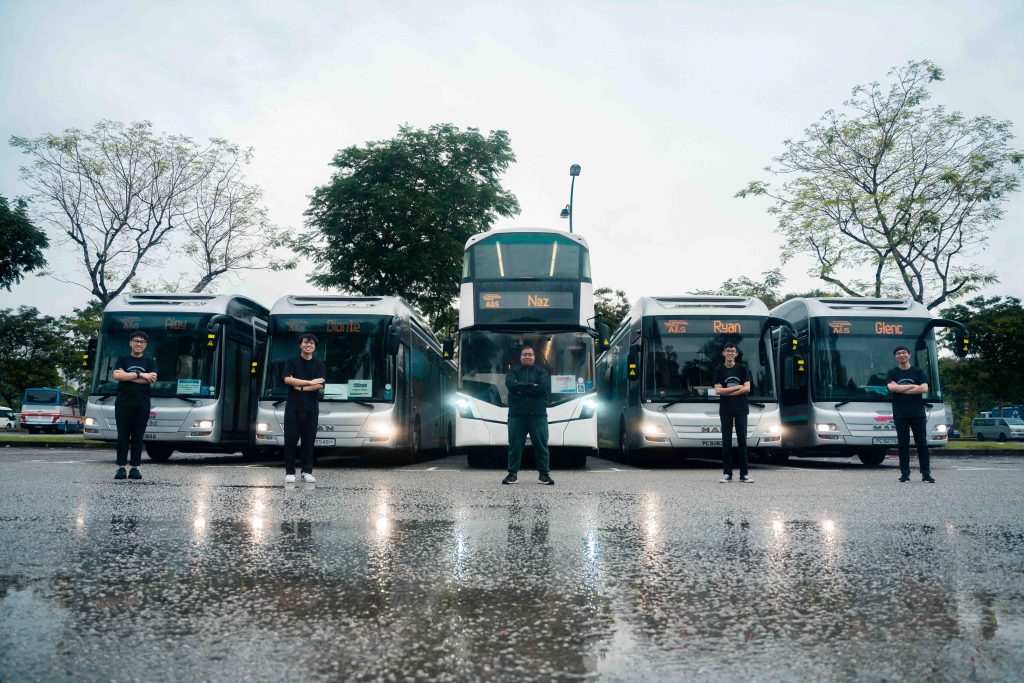
It’s Not Just About Driving a Bus
Although it fulfils and furthers their passion, becoming a bus captain isn’t necessarily the end goal. The group shares that most are interested in joining the ranks of management. They point to Naz, who landed his current executive role through his experience in the industry.
Meanwhile, as much as Dionte loves driving buses, his true passion lies in aviation. Nevertheless, being a bus captain has provided him with valuable transferable skills such as multitasking and time management—things he believes are invaluable in whatever industry he enters. “Most importantly, it gives me a glimpse into what it’s like to be in the transport industry.”
Still, Dionte quickly points out that it isn’t all about career progression.
“I feel there’s more value to this job than just driving a bus—like serving the community, getting people home safe, planning routes properly.”
While it’s an upstanding duty to safely ferry passengers from one location to another, it’s also a heavy responsibility. And it’s not as easy as one might think. Since buses require more time to apply emergency brakes than regular cars, drivers must always think ahead.
Ensuring that passengers remain comfortable might even mean running a red light and accepting the consequences to avoid the risk of passengers tumbling from an abrupt stop.
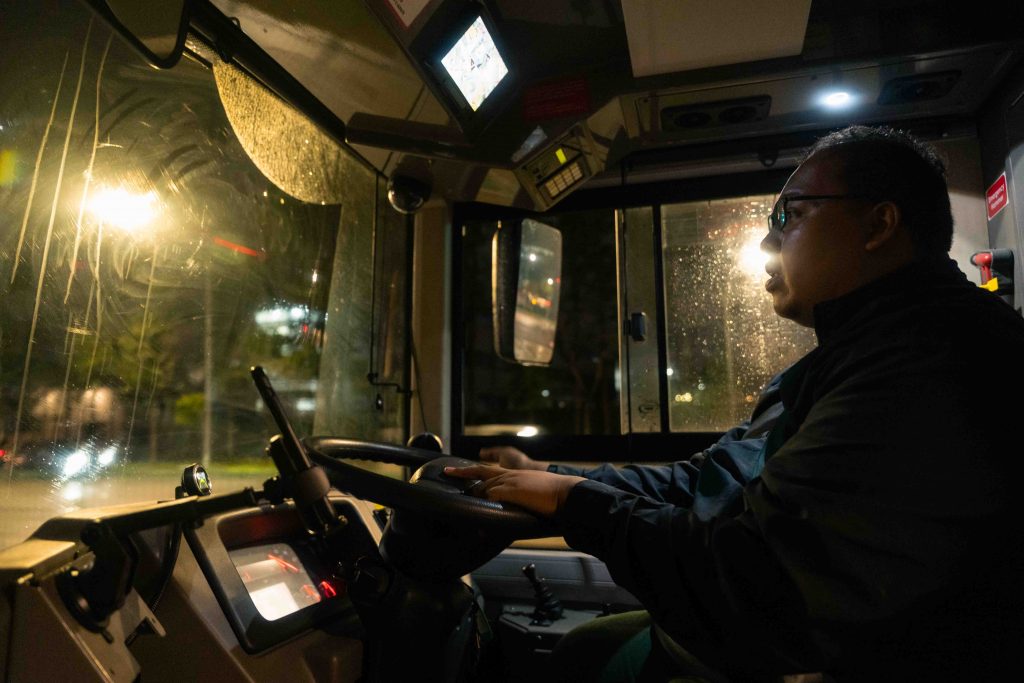
Uncles for Life
Driving a bus must be a stressful job, I muse aloud.
To my surprise, all the bus captains refute this assertion. Instead, they erupt into a chorus of the perks of driving a bus. Benefits include having exclusive use of the bus lane and other vehicles making way for them on the road.
Glenc Soh, 23, who’s been quiet for most of the discussion, pipes up. “It also brings me to places that I usually won’t go myself.”
Such places, Glenc tells me, include the secluded wilderness of Tuas and even the new Changi Terminal 5, which the public doesn’t have access to yet.

Aloysius elaborates. “We get to see different views because our trips vary weekly—maybe even daily. We also get to serve many different types of people. In fact, when school kids go on excursions, they’ll be like ‘wow’ and ‘hello uncle’.”
“Our captains, the moment they get behind the wheel, they’ve already signed themselves up to be called ‘uncle’ for life,” Naz jokes.
“It’s a small thing we can’t escape from, no matter how young we may be.”
But for these passionate, enterprising, and hardworking bus captains, being called an ‘uncle’ is a small price to pay for living your dreams. At this point, surrounded by such overwhelming and enthusiastic individuals, I ponder that book I’ve always wanted to write. Or maybe I can find a way to turn my toy-collecting hobby into a viable career.
After all, if a bunch of guys who are four to eight years my junior can achieve their dreams, why can’t I?
As if able to hear my thoughts, Dionte assures me: “It’s never wrong to chase your passion, even though it may be weird to some people. Just go with your feelings. And maybe one day something will happen.”
“If you truly enjoy it,” Aloysius adds, “I think it should not matter too much what others think. If you enjoy it can already.”







